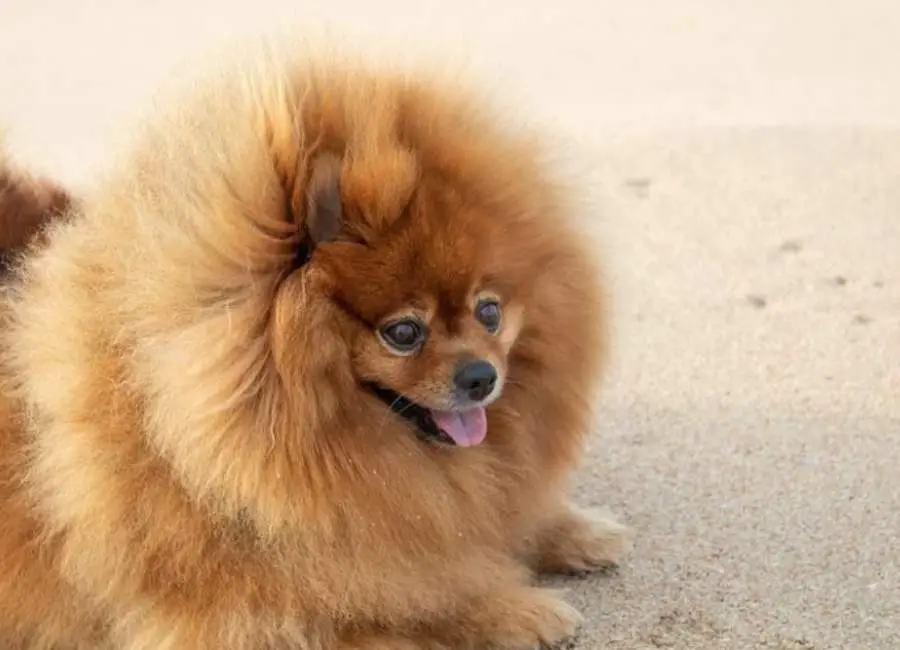Older Pomeranians & Old Age Problems

Caring for older Pomeranians is an important part of living with a Pomeranian as it requires time and patience.
This post will address ways of caring for older Pomeranians and the problem older Pomeranians face.
Caring For Older Pomeranian
Here are some common ways of caring for older Pomeranians:
- Provide proper nutrition: Your Pomeranian’s dietary requirements may alter as they get older. To choose the ideal food for your senior Pomeranian, speak with your veterinarian.
- Schedule regular vet visits: To make sure your older Pomeranian is healthy and to identify any possible health concerns early on, it’s crucial to take them to the vet on a regular basis.
- Provide regular grooming: Pomeranians have a thick double coat that has to be groomed frequently to keep it looking good and healthy. Brushing, bathing, and nail clipping fall under this category.
- Provide little exercises: Older Pomeranians still require frequent exercise in order to keep their weight in check and keep their muscles in good shape. It’s crucial to balance activity with your Pomeranian’s age and physical condition, though, to avoid overdoing it.
- Provide regular dental care: All dogs need dental care, but older Pomeranians in particular do as they are more prone to oral issues. Make sure to frequently wash your Pomeranian’s teeth and have a doctor examine them.
- Make them more comfortable: Your Pomeranian may find it more difficult to move about as they become older and may be more prone to joint problems. To make it simpler for them to move around, think about investing in a cozy bed, ramps, or steps.
- Provide mental stimulation: Even as they age, Pomeranians can still benefit from mental stimulation through games, training sessions, and treks in unfamiliar regions.
- Provide more love and attention: Like any dogs, senior Pomeranians still require their owners’ love and care. Spending quality time with your Pomeranian and showing them lots of love and attention is important.
- Provide the necessary medications: It’s crucial to adhere to the recommended dosage and schedule for medications if your Pomeranian has any medical issues that call for them.
Pomeranian old age problems and solutions
Here are some common Pomeranian old age problems and solutions:
- Arthritis: In senior Pomeranians, arthritis is a prevalent issue that can lead to discomfort, stiffness, and trouble moving. Medication, weight control, and physical therapy are available as treatment options.
- Cognitive decline: The cognitive impairment that some elderly Pomeranians may undergo might lead to behavioral abnormalities and memory loss. Preventing cognitive decline can be achieved by supplying mental stimulation via games and training tools.
- Dental problems: In elderly Pomeranians, poor oral hygiene can result in tooth loss, gum disease, and other issues. Brushing and flossing your teeth on a regular basis can help avoid these problems.
- Incontinence: Older Pomeranians may struggle with incontinence, which is the inability to control pee and bowel movements. Medication or dietary modifications may be part of the treatment.
- Loss of hearing: Older Pomeranians frequently have hearing loss, which can make your dog more agitated or less receptive to your directions. With a deaf dog, hand gestures and visual clues can be used to communicate.
- Vision loss: Another prevalent issue with elderly Pomeranians is vision loss. Your dog can navigate its surroundings better if you provide it with a secure and comfortable setting and refrain from making unexpected moves.
- Kidney disease: Older Pomeranians are susceptible to the dangerous ailment known as kidney disease. Medication, dietary modifications, and routine blood tests to check kidney function may all be part of the treatment plan.
- Cancer: Older Pomeranians frequently struggle with cancer, which can take many different forms. Radiation therapy, chemotherapy, and surgery are all possible forms of treatment.
- Heart disease: Older Pomeranians are susceptible to heart disease, a dangerous ailment. Medication, food modifications, and routine veterinary checkups are all possible forms of treatment.
It’s crucial to take your Pomeranian dog to the vet on a regular basis for checkups and to talk about any health issues you may have.
As your Pomeranian ages, early identification and treatment of any health issues can help to enhance its quality of life.
The aging process in Pomeranians
Like other dogs, Pomeranians mature and experience a variety of physical and behavioral changes as they become older.
12–16 years is considered middle-aged or senior lifespan for a petite breed like the Pomeranian.
Pomeranians may go through a number of physical changes as they become older.
Graying fur, gaining weight, and a drop in vigor are a few examples.
Pomeranians may also suffer from age-related health conditions like arthritis, eyesight or hearing loss, dental disorders, or concerns with their teeth.
It’s crucial to keep a lookout for these changes and speak with a veterinarian for the best course of action.
Learn more about the common signs of a dying Pomeranian.
Importance of providing love and care to your older Pomeranians
Your senior Pomeranian needs love and attention if you want them to be happy and healthy in general.
Physical and behavioral changes brought on by aging in dogs may lower their quality of life.
You can promote a comfortable and happy aging process for your elder Pom by providing them love and attention.
Overall, taking care of an older Pom’s physical, emotional, and mental needs is an important part of demonstrating your love and care for them.
You may assist your elder Pom in aging peacefully and contentedly by giving regular veterinarian treatment, a nutritious food and exercise regimen, suitable grooming and cleanliness, and pleasant surroundings.
